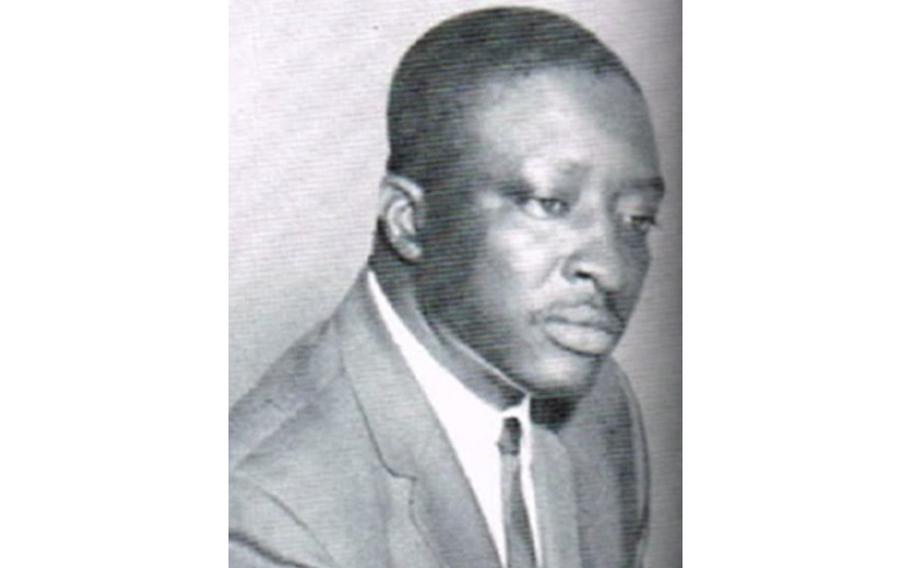
The Rev. Frank Dukes, an early leader in Birmingham’s Civil Rights Movement and a veteran of the Korean War, died over the weekend at age 92. As student government association president at Miles College, Dukes in 1962 organized students to challenge Birmingham’s segregationist policies. (Miles College/Facebook)
(Tribune News Service) — The Rev. Frank Dukes, an early leader in Birmingham’s Civil Rights Movement, died over the weekend at age 92.
His daughter, Donna Dukes, announced his death in a Facebook post on Saturday.
Citing his litany of achievements, she called her father an “icon of the Birmingham Civil Rights Movement.”
A veteran of the Korean War, Frank Dukes later enrolled at Miles College as an adult student. As the student government association president, the Fairfield native in 1962 organized students to challenge Birmingham’s segregationist policies. Boycotts had been declared illegal in Alabama, so Dukes and others called their activity a “selective buying campaign.” The effort gained momentum as Black residents refused to patronize downtown businesses that held firm to segregation practices and refused to hire Black workers.
“We thought that if we could stop the Black folks from shopping in downtown Birmingham, that would make Bull Conner understand that we were not going to keep spending money downtown where we couldn’t work,” Dukes said in a video interview with the University of Alabama in 2018. “We had the business department students to do research, and they found out that all the stores in downtown Birmingham operated on a 12 percent profit margin and that if we could cut the profit margin down, they would listen to us and do something about eliminating segregation and discrimination.”
The campaign proved successful by delivering a major economic blow to businesses and forcing large stores to desegregate their facilities.
Historian Barry McNealy told AL.com that Dukes was part of a generation of veterans who had fought injustice around the world and returned home with a new motivation to improve conditions for themselves and their own communities.
“Coming home from the military as many people did during that time they felt as if they fought for things that we not being granted to people that looked just like them at home, and Rev. Frank Dukes was one of those people,” said McNealy, a historical content expert at the Birmingham Civil Rights Institute. “He brought Miles College into the movement in a very powerful and prominent role. He was able to push those conservative African American leaders in Birmingham into a more visible role in criticizing segregation and the city of Birmingham’s laws and the way people were being treated during that time.”
Dukes’ leadership solidified youth involvement and established Miles as a center of civil rights activities.
“Rev. Frank Dukes’ legacy is in the ministry and the faith that those leaders had, and it also touched into the youth of those times who were determined to see that thing became different for times to come,” McNealy said.
Bobbie Knight, the president of Miles College, called Dukes’ death a “profound loss” and called on the community to embody “the spirit of unity and commitment he so fervently championed.”
“I challenge each of you to be a committed and intentional ally, to delve deep into the cause of justice, and to forge a path forward as one cohesive team,” Knight said in a statement Monday afternoon. “In collaboration, our collective passion, resounding voices and innovative ideas possess the power to instigate the societal change we yearn for. Inspired by the timeless words of Rev. Frank Dukes, let us carry forward his belief — ‘this we believe’ — and work together to create a world where justice prevails and unity triumphs.”
A historic marker was erected in 2014 on the Miles College campus to enshrine its place in civil rights history.
Dukes also served as a bodyguard for Martin Luther King Jr. in Birmingham.
“King was the living personification of the poem ‘If’ by Rudyard Kipling,” Dukes said in the 2018 interview. “He could walk with kings and not lose his common touch. Witnessing his ability to think, strategize and execute continue to help me to this day.”
Dukes continued his activism with the Alabama Christian Movement for Human Rights, the Southern Christian Leadership Conference and the NAACP.
Dukes later served as an administrator at his alma mater. He also worked alongside his daughter at Maranatha Academy, a school she founded to provide opportunities for at-risk students and a pipeline to college and career training. At Maranatha, Dukes was seen as a living link to Birmingham’s past for younger generations.
Donna Dukes also produced a documentary, “Stand! Untold Stories from The Civil Rights Movement,” which aired on Alabama Public Television and told the story of her father’s role in the Movement.
In 2018, the University of Alabama honored Frank Dukes with the “Mountaintop Award,” an annual lifetime achievement award presented to a person who has demonstrated a commitment to justice.
“I just feel very fortunate to have had the chance to meet him and his family,” said Samory T. Pruitt, University of Alabama Vice President for Community Affairs whose office organizes the award. “He was an inspiration to a lot of people and we were very, very fortunate to share his story with others. When he walked into a room you knew he was somebody.”
Speaking in a video for the awards ceremony in 2018, Dukes, a longtime pastor, described his social activism as a part of his larger ministry.
“If we are ever to have a just society for everybody is when all people, regardless of race, creed or color, have a right to justice, freedom and equality, and then there will be the ideal society that Jesus Christ would want us to have,” he said.
©2023 Advance Local Media LLC.
Visit al.com.
Distributed by Tribune Content Agency, LLC.